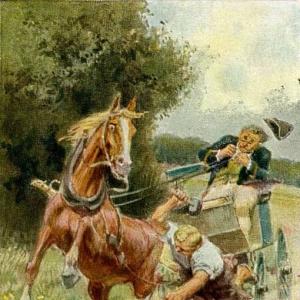Reading time for children: 11 min
An honest farmer had once an ass that had been a faithful servant to him a great many years, but was now growing old and every day more and more unfit for work. His master therefore was tired of keeping him and began to think of putting an end to him; but the ass, who saw that some mischief was in the wind, took himself slyly off, and began his journey towards the great city, „For there,“ thought he, „I may turn musician.“
After he had travelled a little way, he spied a dog lying by the road side and panting as if he were tired. „What makes you pant so, my friend?“ said the ass. „Alas!“ said the dog, „my master was going to knock me on the head, because I am old and weak, and can no longer make myself useful to him in hunting. So I ran away, but what can I do to earn my livelihood?“ – „Hark ye!“ said the ass, „I am going to the great city to turn musician: suppose you go with me, and try what you can do in the same way?“ The dog said he was willing, and they jogged on together.
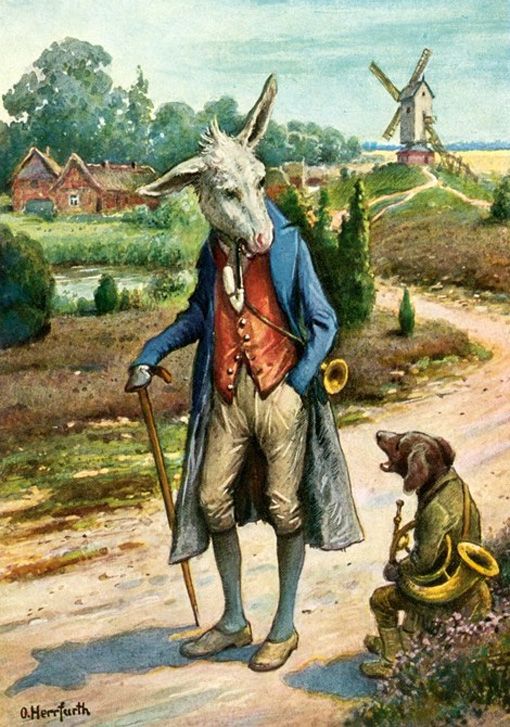 Image: Oskar Herrfurth (1862-1934)
Image: Oskar Herrfurth (1862-1934)They had not gone far before they saw a cat sitting in the middle oft he road and making a most rueful face. „Pray, my good lady,“ said the ass, „what’s the matter with you? You look quite out of spirits!“ – „Ah,me!“ said the cat, „how can one be in good spirits when one’s life is in danger? Because I am beginning to grow old, and had rather lie at my ease by the fire than run about the house after the mice, my mistress laid hold of me, and was going to drown me; and though I have been lucky enough to get away from her, I do not know what I am to live upon.“ – „Oh,“ said the ass, „by all means go with us to the great city. You are a good night singer, and may make your fortune as a musician.“ The cat was pleased with the thought, and joined the party.
Soon afterwards, as they were passing by a farmyard, they saw a cock perched upon a gate, and screaming out with all his might and main.“Bravo!“ said the ass. „Upon my word, you make a famous noise. Pray what is all this about?“ – „Why,“ said the cock, „I was just now saying that we should have fine weather for our washing-day, and yet my mistress and the cook don“t thank me for my pains, but threaten to cutoff my head tomorrow, and make broth of me for the guests that are coming on Sunday!“ – „Heaven forbid!“ said the ass, „come with us Master Chanticleer. It will be better, at any rate, than staying here to have your head cut off! Besides, who knows? If we care to sing in tune, we may get up some kind of a concert. So come along with us.“ – „With all my heart,“ said the cock: so they all four went on jollily together.
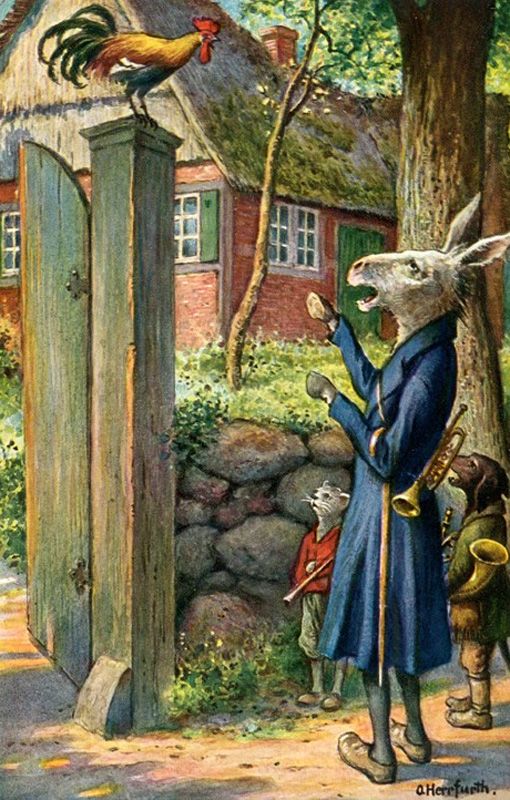 Image: Oskar Herrfurth (1862-1934)
Image: Oskar Herrfurth (1862-1934)They could not, however, reach the great city the first day. So when night came on, they went into a wood to sleep. The ass and the dog laid themselves down under a great tree, and the cat climbed up into the branches. While the cock, thinking that the higher he sat the safer he should be, flew up to the very top of the tree, and then,according to his custom, before he went to sleep, looked out on all sides of him to see that everything was well. In doing this, he saw afar off something bright and shining and calling to his companions said, „There must be a house no great way off, for I see a light.“ – „If that be the case,“ said the ass, „we had better change our quarters,for our lodging is not the best in the world!“
„Besides,“ added the dog, „I should not be the worse for a bone or two, or a bit of meat.’so they walked off together towards the spot where Chanticleer had seen the light, and as they drew near it became larger and brighter,till they at last came close to a house in which a gang of robbers lived. The ass, being the tallest of the company, marched up to the window and peeped in. „Well, Donkey,“ said Chanticleer, „what do you see?“ – „What do I see?“ replied the ass. „Why, I see a table spread with all kinds of good things, and robbers sitting round it making merry.“ – „That would be a noble lodging for us,“ said the cock.
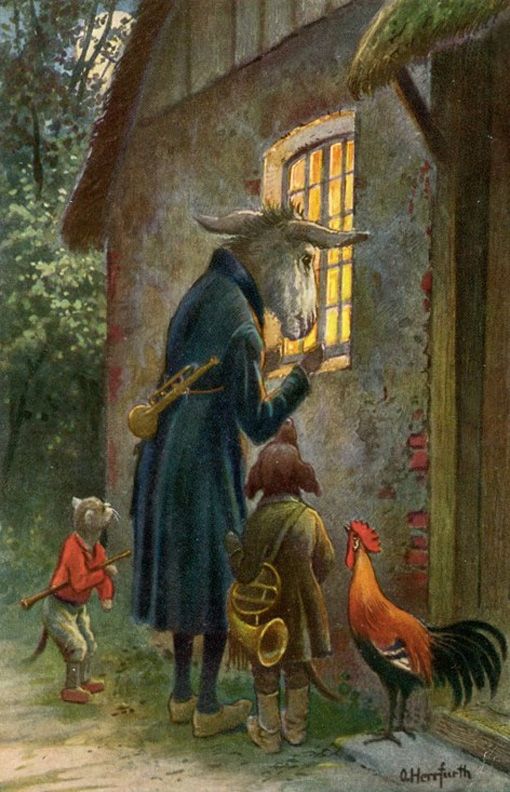 Image: Oskar Herrfurth (1862-1934)
Image: Oskar Herrfurth (1862-1934)„Yes,“ said the ass, „if we could only get in“. So they consulted together how they should contrive to get the robbers out; and at last they hit upon a plan. The ass placed himself upright on his hind legs, with his fore feet resting against the window. The dog got upon his back. The cat scrambled up to the dog’s shoulders, and the cock flew up and sat upon the cat’s head. When all was ready a signal was given, and they began their music. The ass brayed, the dog barked, the cat mewed, and the cock screamed; and then they all broke through the window at once,and came tumbling into the room, amongst the broken glass, with a most hideous clatter! The robbers, who had been not a little frightened by the opening concert, had now no doubt that some frightful hobgoblin had broken in upon them, and scampered away as fast as they could.
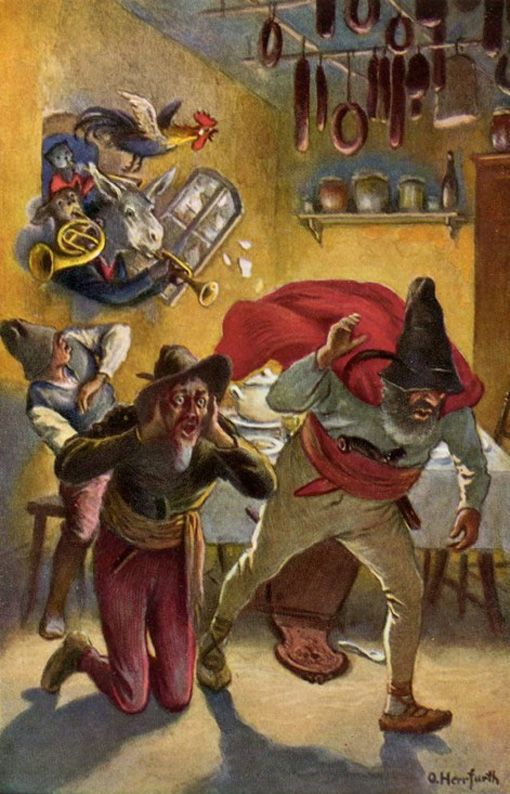 Image: Oskar Herrfurth (1862-1934)
Image: Oskar Herrfurth (1862-1934)The coast once clear, our travellers soon sat down and dispatched what the robbers had left, with as much eagerness as if they had not expected to eat again for a month. As soon as they had satisfied themselves, they put out the lights, and each once more sought out a resting-place to his own liking. The donkey laid himself down upon a heap of straw in the yard, the dog stretched himself upon a mat behind the door, the cat rolled herself up on the hearth before the warm ashes, and the cock perched upon a beam on the top of the house; and,as they were all rather tired with their journey, they soon fell asleep.
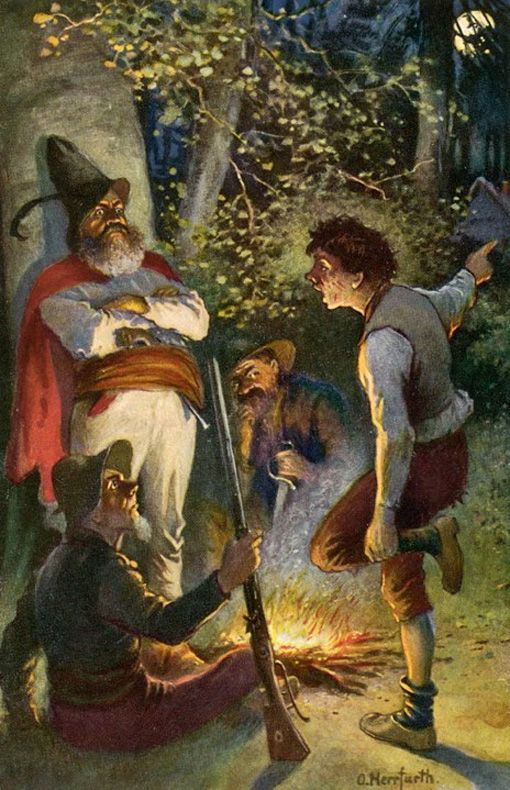 Image: Oskar Herrfurth (1862-1934)
Image: Oskar Herrfurth (1862-1934)But about midnight, when the robbers saw from afar that the lights were out and that all seemed quiet, they began to think that they had been in too great a hurry to run away; and one of them, who was bolder than the rest, went to see what was going on. Finding everything still, he marched into the kitchen, and groped about till he found a match in order to light a candle; and then, espying the glittering fiery eyes of the cat, he mistook them for live coals, and held the match to them to light it. But the cat, not understanding this joke,sprang at his face, and spat, and scratched at him. This frightened him dreadfully, and away he ran to the back door; but there the dog jumped up and bit him in the leg; and as he was crossing over the yard the ass kicked him; and the cock, who had been awakened by the noise, crowed with all his might.
At this the robber ran back as fast as he could to his comrades, and told the captain how a horrid witch had got into the house, and had spat at him and scratched his face with her long bony fingers. How a man with a knife in his hand had hidden himself behind the door, and stabbed him in the leg. How a black monster stood in the yard and struck him with a club, and how the devil had sat upon the top of the house and cried out, „Throw the rascal up here!“
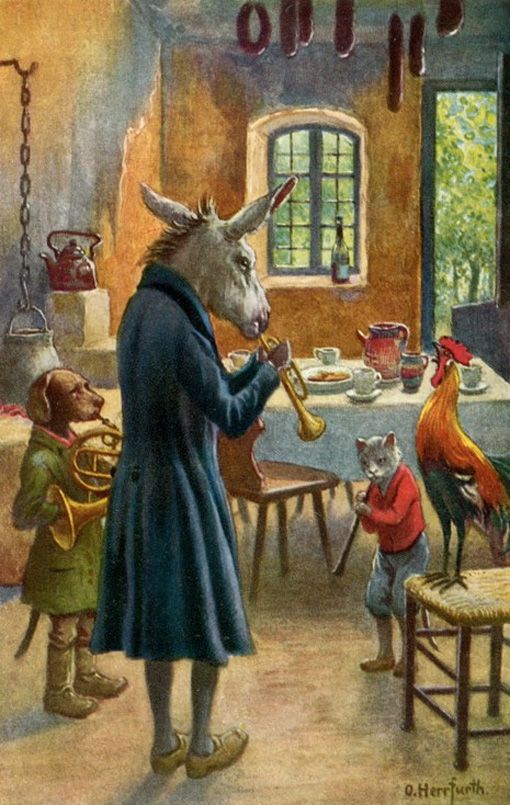 Image: Oskar Herrfurth (1862-1934)
Image: Oskar Herrfurth (1862-1934)After this the robbers never dared to go back to the house; but the musicians were so pleased with their quarters that they took up their abode there; and there they are, I dare say, at this very day.
 Learn languages. Double-tap on a word.Learn languages in context with Childstories.org and Deepl.com.
Learn languages. Double-tap on a word.Learn languages in context with Childstories.org and Deepl.com.Backgrounds to fairy tale „The Travelling Musicians“
„The Travelling Musicians“ is a fairy tale from the collection of the Brothers Grimm, who were German scholars and cultural researchers in the 19th century. Jacob and Wilhelm Grimm are best known for their collection of fairy tales, which they gathered from various sources, aiming to preserve the Germanic folkloric tradition.
The stories in the Grimm brothers‘ collection were not originally intended for children. They were scholarly compilations of folk narratives, often filled with violence, cruelty, and complex themes. However, as their popularity grew, the Grimm brothers began to revise their collection, making the stories more suitable for children.
It’s important to note that „The Travelling Musicians“ is a traditional folktale, which means its origins are somewhat elusive. Folktales are typically stories that have been passed down orally from generation to generation, and they often vary significantly in detail from one telling to another. By the time the Grimm brothers compiled their collection, these stories had already been told and retold countless times.
„The Travelling Musicians“ reflects several common themes found in fairy tales and folktales, such as animals with human-like qualities, journeys leading to transformation, and clever protagonists outsmarting stronger opponents. The tale showcases the characteristic Grimm’s narrative style – a blend of simple storytelling with moral lessons, whimsical humor, and darker elements.
As with many folktales, the story has likely been influenced by the socio-cultural context of its time. In the early 19th century, societal structures were rigid, and the tale could be seen as a commentary on the treatment of the elderly, the working class, and the value of unity and resilience in the face of adversity.
Interpretations to fairy tale „The Travelling Musicians“
„The Travelling Musicians“ is a classic fairy tale that can be interpreted from multiple perspectives. Here are some common interpretations:
Value of Uniting in Adversity: The story demonstrates the power of unity. Each of the four animals is facing similar hardships. They are old and considered useless by their previous owners. Yet, by banding together, they not only manage to survive but also successfully drive away the robbers and find a new home. This tale underscores the idea that there’s strength in unity and that by supporting each other, individuals can overcome challenges that would be difficult to handle alone.
Resilience and Adaptability: The tale also illustrates the virtues of resilience and adaptability. Each animal in the story refuses to accept their dire circumstances and instead embarks on a journey to change their fate. They adapt to their situation, repurpose their abilities (using their voices not just for music but also as a means to scare the robbers), and eventually find a new, comfortable home.
Age and Value: A central theme in the story is the struggle faced by the animals due to their age. Their masters view them as disposable when they’re no longer able to perform their traditional roles. However, the animals prove that they still have value and can contribute in different ways. This underscores a critique of an utilitarian viewpoint that discards individuals who aren’t able to produce or work in conventional ways, and stresses that every being has intrinsic value, regardless of their productivity.
Critique of Social Order: The story could also be read as a critique of the existing social order. The animals, who serve humans and are discarded when no longer useful, represent the lower social classes, while their masters represent the upper classes. Their rebellion and eventual success can be seen as a triumphant inversion of the established order.
Humor and Irony: Lastly, the story is filled with humor and irony, particularly in the depiction of the animals‘ scare tactics and the robbers‘ ridiculous fears. The robbers, typically figures of fear and power, are scared off by a group of old, discarded animals. This may reflect the Grimm brothers‘ knack for imbuing their tales with a sense of whimsy and irony.
As with many fairy tales, interpretations can vary widely based on cultural, historical, and personal perspectives.
Summary of the Plot
„The Travelling Musicians“ is a fairy tale by the Brothers Grimm about a group of animals that band together to escape their unfortunate circumstances and find a new life in the city. The story begins with an aging ass whose master is considering putting him down because he’s no longer useful. Sensing danger, the ass decides to travel to the city and become a musician. Along the way, he encounters a dog who’s also been abandoned by his master for being too old. The ass suggests they travel together and try their luck as musicians in the city. The dog agrees and they continue their journey.
Further down the road, they meet a cat who has escaped from her mistress who was trying to drown her for being too old to catch mice. The ass invites the cat to join their journey to the city where she might find success as a night singer. The cat happily joins the party. Next, they come across a rooster, perched on a gate, singing about the coming fine weather. His owners, however, do not appreciate his song and plan to cut off his head for a Sunday feast. Upon hearing this, the ass encourages the rooster to join their city-bound group to avoid his impending fate. The rooster agrees and they all set off together.
Since they cannot reach the city in one day, they decide to rest in a forest for the night. While settling in, the rooster, perched at the top of a tree, spots a distant light and suggests they might find better accommodations there. The group agrees and makes their way towards the light, which leads them to a house occupied by a gang of robbers. Peering into the house, the ass sees a table filled with food and robbers making merry. Desiring the food and a better place to rest, the animals devise a plan to scare off the robbers. The ass stands on his hind legs, the dog climbs on the ass, the cat ascends to the dog’s shoulders, and the rooster perches on the cat’s head. Then, they all make a loud, discordant noise, and crash through the window into the house, causing the frightened robbers to run away.
Once the robbers have fled, the animals settle in, eating the left-over food and choosing comfortable spots to sleep. However, in the middle of the night, one of the robbers returns to check on the house. In the dark, he mistakes the cat’s eyes for live coals and tries to light a match. The cat, feeling threatened, attacks him, followed by the dog biting his leg, the ass kicking him, and the rooster loudly crowing. Terrified, the robber runs back to his comrades and tells them of the horrifying creatures he encountered. He mistakenly describes the cat as a witch, the dog as a man with a knife, the ass as a black monster with a club, and the rooster as the devil. After hearing the story, the robbers are too scared to return to the house. The animals, now free of the robbers, decide to stay in the house, content with their new home. And as the story concludes, it’s suggested that they might still be living there to this day.
Informations for scientific analysis
Fairy tale statistics | Value |
|---|---|
| Aarne-Thompson-Uther-Index | ATU Typ 130 |
| Readability Index by Björnsson | 30.7 |
| Flesch-Reading-Ease Index | 82 |
| Flesch–Kincaid Grade-Level | 7 |
| Gunning Fog Index | 9.3 |
| Coleman–Liau Index | 6.9 |
| SMOG Index | 7.7 |
| Automated Readability Index | 7.1 |
| Character Count | 6.944 |
| Letter Count | 5.270 |
| Sentence Count | 66 |
| Word Count | 1.365 |
| Average Words per Sentence | 20,68 |
| Words with more than 6 letters | 137 |
| Percentage of long words | 10% |
| Number of Syllables | 1.676 |
| Average Syllables per Word | 1,23 |
| Words with three Syllables | 39 |
| Percentage Words with three Syllables | 2.9% |



